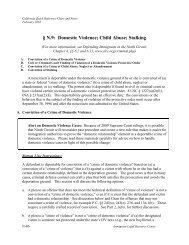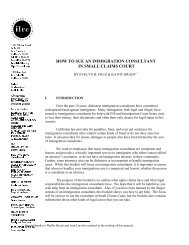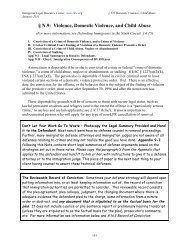Inspiring Leadership in Immigrant Communities - ILRC
Inspiring Leadership in Immigrant Communities - ILRC
Inspiring Leadership in Immigrant Communities - ILRC
- No tags were found...
You also want an ePaper? Increase the reach of your titles
YUMPU automatically turns print PDFs into web optimized ePapers that Google loves.
<strong>Inspir<strong>in</strong>g</strong> <strong>Leadership</strong> <strong>in</strong> <strong>Immigrant</strong> <strong>Communities</strong>January 2003If the client is do<strong>in</strong>g the negotiat<strong>in</strong>g, he or she may br<strong>in</strong>g a friend to translate or providemoral support. The friend might not be allowed to participate <strong>in</strong> the actual meet<strong>in</strong>g, butmight be allowed to attend.If possible, talk to others about the people with whom you are go<strong>in</strong>g to negotiate. F<strong>in</strong>d out whoresponds to sympathetic stories and who responds to threats. Share stories of what works withdifferent people with whom you might negotiate.6. Know what you or the person you are assist<strong>in</strong>g wants. Be prepared to compromise.Figure out what you or the person you are assist<strong>in</strong>g wants from the negotiation. Make sure youknow all your options. Explore any other alternatives that might fulfill what you or the peopleyou are help<strong>in</strong>g want. Understand what compromises your side might agree to and whatcompromises the other side might agree to.7. Organize with others.Governmental agencies, landlords, schools and others often pay more attention to a group thanan <strong>in</strong>dividual. Coalitions of agencies or of agencies and attorneys can get more benefits for thecommunity member than they can work alone. They can speak with one voice to the other side aswell as to the media, local government and congressional representatives. They can requestofficial meet<strong>in</strong>gs, where they can try to solve problems on a policy level <strong>in</strong>stead of just<strong>in</strong>dividual cases. You may form a coalition to deal with just one problem—such as abuses <strong>in</strong> INSraids—or to deal with problems on an ongo<strong>in</strong>g basis. Many exist<strong>in</strong>g coalitions or other groupsare will<strong>in</strong>g to advise people who are form<strong>in</strong>g a group.Negotiation Strategies1. Be prepared to make a legal argument <strong>in</strong> case you have to. Br<strong>in</strong>g legal authority andsupport<strong>in</strong>g documents.Negotiat<strong>in</strong>g can <strong>in</strong>clude mak<strong>in</strong>g a legal argument to the other side. You may need to br<strong>in</strong>g alawyer or paralegal with you to the negotiation, or you may need a lawyer to expla<strong>in</strong> the legalangle or even write a letter for you to present at the negotiation.2. Attack the problem, not the person on the other side. If necessary, accept a reasonablecompromise.Whenever possible, separate the problem you and your client are work<strong>in</strong>g on from the personwith whom you are negotiat<strong>in</strong>g. Some problems are not the <strong>in</strong>dividual worker’s fault. Moreover,you may need to negotiate with the same person another time. It is important to ma<strong>in</strong>ta<strong>in</strong> as gooda relationship as possible. Be open to look<strong>in</strong>g at the problem from the worker’s viewpo<strong>in</strong>t andmak<strong>in</strong>g a reasonable compromise.7-6
















